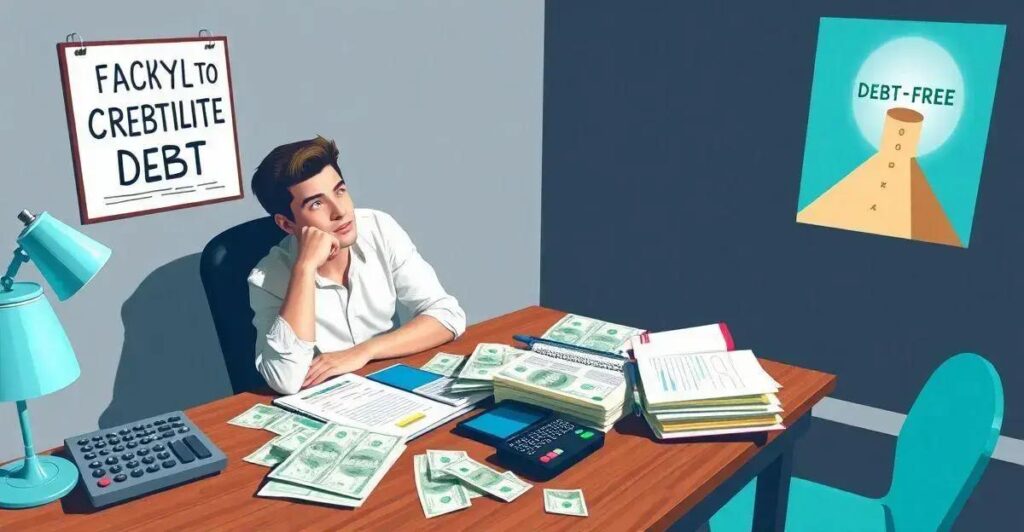Are you tired of living paycheck to paycheck, struggling to make ends meet due to credit card debt? You’re not alone. In the United States, the average credit card debt per household is over $15,000.
Credit card debt can be a significant burden, affecting your credit score, relationships, and overall well-being.
But what if you could eliminate this financial stress and start building a secure financial future?
In this article, we’ll explore the surprising solutions to pay off credit card debt and get you back on track.
Understanding Credit Card Debt: The Root of the Problem
Credit card debt can arise from various factors, including overspending, lack of budgeting, and unforeseen expenses.
It’s essential to understand the root cause of your debt to develop an effective plan for paying it off.
Some common reasons for credit card debt include:
- Spending more than you earn
- Falling behind on payments
- Using credit cards for long-term expenses
Once you identify the primary cause of your debt, you can start working on a strategy to overcome it.
This may involve cutting expenses, increasing income, or seeking assistance from credit counseling services.
The Consequences of Credit Card Debt: What You Need to Know

When left unchecked, credit card debt can have severe consequences on your financial well-being. Some of the most significant consequences of credit card debt include:
Damage to your credit score, making it harder to get loans or credit in the future.
Collection agency calls and letters, causing stress and anxiety.
Loss of financial security, making it difficult to cover essential expenses.
Increased debt interest rates, resulting in higher monthly payments.
Impact on your relationships, causing financial stress and tension with loved ones.
5 Surprising Solutions to Pay Off Credit Card Debt
If you’re struggling to pay off credit card debt, you may be feeling overwhelmed and unsure of where to turn. Fortunately, there are several surprising solutions that can help you get back on track. Here are five unexpected ways to pay off credit card debt:
Consider a balance transfer: If you have a good credit score, you may be able to transfer your credit card balance to a new card with a 0% interest rate for a promotional period.
Use the snowball method: Pay off your credit cards one by one, starting with the smallest balance first, to build momentum and confidence.
Negotiate with your creditors: Reach out to your credit card companies and ask if they can offer any temporary hardship programs or reduced interest rates to help you pay off your debt.
Consolidate your debt: If you have multiple credit cards with high interest rates, you may be able to consolidate your debt into a single loan with a lower interest rate and a single monthly payment.
Use the avalanche method: Pay off your credit cards one by one, starting with the card with the highest interest rate first, to save the most money in interest over time.
The Importance of Budgeting and Saving

Budgeting and saving are essential skills for anyone looking to manage their finances effectively.
When it comes to credit card debt, budgeting and saving can be particularly important. Here are some reasons why:
- Creating a budget helps you track your expenses, making it easier to identify areas where you can cut back and free up more money for debt repayment.
- Saving money provides a safety net, allowing you to cover unexpected expenses and avoid going further into debt.
- Budgeting and saving can help you avoid overspending, reducing the likelihood that you’ll accumulate more debt in the future.
- Creating a budget and saving can also help you prioritize your debt repayment, allowing you to focus on the debts that matter most and make progress towards becoming debt-free.
Ways to Avoid Credit Card Debt in the Future
Avoiding credit card debt in the future requires a combination of financial discipline, smart spending habits, and a solid understanding of how credit works.
Here are some ways to avoid credit card debt in the future:
- Make a budget and track your expenses to ensure you’re not overspending and can afford your monthly payments.
- Pay your credit card balance in full each month to avoid interest charges and debt accumulation.
- Use credit cards responsibly, avoiding excessive spending and only using credit for essential purchases.
- Build an emergency fund to cover unexpected expenses and avoid going further into debt.
- Monitor your credit report to catch any errors or signs of identity theft and take action to correct them.
Conclusion: Breaking Free from Credit Card Debt

Breaking free from credit card debt requires a combination of financial discipline, smart spending habits, and a solid understanding of how credit works.
By understanding the root of the problem, facing the consequences, and seeking out surprising solutions, you can create a plan to pay off your debt and stay debt-free in the future.
Remember to prioritize budgeting and saving, and avoid credit card debt in the future by making smart financial choices.
With the right strategies and mindset, you can break free from credit card debt and achieve financial freedom.
FAQ: Common Questions About Credit Card Debt and Financial Freedom
What are the consequences of not paying credit card debt?
If you don’t pay your credit card debt, it can lead to damaged credit scores, increased interest rates, and even collection agency calls. It’s essential to prioritize debt repayment to avoid these consequences.
How can I create a budget to pay off credit card debt?
To create a budget, track your income and expenses, identify areas where you can cut back, and allocate your money towards debt repayment. Consider using the 50/30/20 rule: 50% for necessities, 30% for discretionary spending, and 20% for saving and debt repayment.
What are some surprising solutions to pay off credit card debt?
Some surprising solutions include balance transfers, the snowball method, and negotiating with creditors. It’s essential to explore these options and find the best solution for your financial situation.
How can I avoid credit card debt in the future?
To avoid credit card debt, prioritize budgeting and saving, and make smart financial choices. Avoid overspending, and consider using cash or debit cards for discretionary purchases. Additionally, monitor your credit report and credit score regularly to catch any errors or signs of identity theft.
What is the importance of budgeting and saving?
Budgeting and saving are essential for financial freedom. By creating a budget, you can track your expenses, prioritize debt repayment, and allocate your money towards long-term goals. Saving also provides a safety net for unexpected expenses and helps you avoid going further into debt.
Can I still achieve financial freedom with credit card debt?
Yes, it’s possible to achieve financial freedom with credit card debt. By prioritizing debt repayment, creating a budget, and making smart financial choices, you can pay off your debt and start building a stronger financial foundation.



